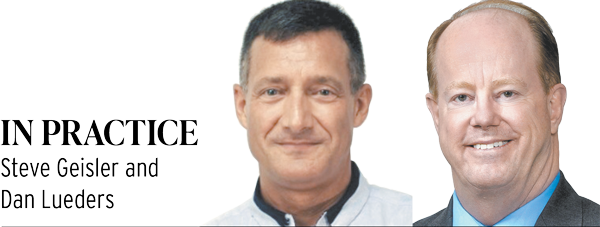Subscriber Benefit
As a subscriber you can listen to articles at work, in the car, or while you work out. Subscribe Now Steve Geisler, general counsel at Knauf Insulation, and Dan Lueders, managing partner at Woodard Emhardt Henry Reeves & Wagner LLP, have worked together on major litigation over the years, including defending against a $248 million demand for alleged trade secret misappropriation and others.
Steve Geisler, general counsel at Knauf Insulation, and Dan Lueders, managing partner at Woodard Emhardt Henry Reeves & Wagner LLP, have worked together on major litigation over the years, including defending against a $248 million demand for alleged trade secret misappropriation and others.
As with most in-house and outside counsel relationships, Steve and Dan attribute their long-standing relationship to their compatible work styles, mutual respect and trust.
When working on major litigation, Steve and Dan agree that without effective communication, neither can do their job.
In-house counsel
From an in-house counsel perspective, I believe that it is critical to have trust in your outside counsel and to establish ground rules and expectations at the outset. I appreciate and expect outside counsel to keep me involved and informed from the outset. It is also important to identify roles and responsibilities, especially when more than one law firm is involved. When everyone knows their role, it is easier to work as a team. Our litigation teams have included several attorneys from different law firms. We do not have the time, patience or budget to cover expenses caused by duplication of efforts that occur when there is competition within the team. Remember, it is all about the client.
In addition to maintaining constant and consistent communication within the team and with senior executives at the client, outside and in-house counsel should remain calm at all times and not overreact to developments or over-promise outcomes. Outside counsel should always be mindful of budgets and be prepared for spinoff matters. Strong relationships and a team mindset are essential for any litigation team, especially in matters involving multiple law firms involved on each side.
Budgets are important, but there needs to be flexibility. Often, litigation fees are driven by the level of activity of the other side, and that cannot be controlled.
I have also found that all work and no play does not create a winning strategy.
Outside counsel
As outside counsel on a major litigation, I try to keep two things top of mind: (1) if I were in-house counsel, how would I like my legal services delivered?; and (2) how do I make my boss (the in-house counsel) look good to his client — the underlying corporate client and its management? And by “good” I do not mean just appearing to nonlawyers to be doing a good job, but actually delivering. This role is very analogous to an associate at a law firm working for a partner. The associate’s directive should really be the same two points. In effect, the partner is the associate’s client.
More specifically, I understand that the client naturally wants and expects quality, timeliness and value. Beyond that, two things that I strive for are project management and no surprises.
Project management is a skill that not all lawyers have and is certainly not taught in law school. It is particularly important in major litigation because often, you are coordinating efforts with two, three and possibly even more law firms. Good coordination is essential to avoiding duplication of effort and bringing the best specialties to bear on some aspects of the case. Minimize working to deadlines; work in advance and provide the client drafts of briefs as early as possible. Also, play nice with co-counsel. Remember, you are only a part of the GC’s team along with the other firms. Teams that bicker in the huddle lose. Plus, you will make some great friends in other firms.
No surprises is more than just communications on a frequent basis. It also means sharing not only the good developments in a case, but also bad developments and projections. They happen, and a sophisticated client knows there are ups and downs in major litigation. As I like to say, you never see two good basketball teams play to a 70-0 score. The other side will score points. Also, in the no surprises department, I prefer to insist at the outset of a major case that the client reduce to writing their specific goals. And “win the case” is too vague. Having written goals upfront helps align expectations and realities. Some goals are not achievable via litigation. It is also a good idea at various checkpoints to see if the goals have shifted. Often, goals may shift as market and financial conditions change.•
Steve Geisler is general counsel at Knauf Insulation and Dan Lueders is the managing partner at Woodard Emhardt Henry Reeves & Wagner LLP. Opinions expressed are those of the authors.
Please enable JavaScript to view this content.
